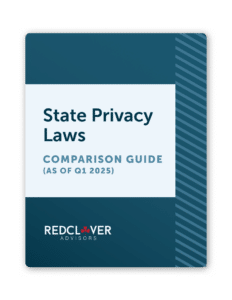When something comes along that makes a person’s life easier, it becomes kind of a no-brainer. Tap-to-pay credit cards? Amazing. Automated bill payments? Fantastic. Self-cleaning cat litter box? The dream.
We are always looking for things to make our lives just a bit easier, whether through automation, AI, kitchen gadgets, or the new Global Privacy Control (GPC).
GPC is a mechanism that addresses an ongoing annoyance for every consumer: the extra step it takes to notify every website of their privacy preferences. It allows users to download a browser extension that will automatically notify websites of the user’s privacy preferences.
Oh, and it’s also free to use.
It’s easy to see how a free browser extension that promises to protect your data and free up your time may be a no-brainer for many people. However, what do businesses need to know about GPC, and how might it interact with the various privacy laws across states?
Let’s talk about it.
What businesses should know about GPC
GPC is a browser-based signal communicating a user’s preference to opt out of data sales and sharing. Once a user downloads the extension and sets their privacy settings, it will alert user preferences to every website they visit via an HTML header or JavaScript code.
More than 50 million people have already downloaded the GPC browser extension. While not available for Safari or Chrome, it can be used on many browsers, including Mozilla FireFox, Brave, and DuckDuckGo, which cater to users who are already privacy-conscious.
The GPC by itself is not legally binding. Still, depending on which jurisdictions apply to your business, users that exercise their right to privacy via the GPC may create a legally binding, universal opt-out mechanism (UOOM).
For example, the California Consumer Protection Act (CCPA), as amended by the California Privacy Rights Act (CPRA), requires businesses to honor user opt-out requests, including those made via the GPC. It is also considered a binding UOOM under the Colorado Privacy Act (CPA); businesses that target or have customers in those states are required to honor GPC signals.
However, while GPC has legal teeth in a growing number of states—including California, Colorado, Connecticut, Delaware, Montana, Minnesota, Nebraska, New Hampshire, New Jersey, and Texas—businesses should consider this a major driver of customer trust no matter what state the signal comes from.
State Privacy Laws Comparison Guide
Stay ahead of state privacy laws with our guide—clear definitions, key dates, and crucial compliance tips!

Why GPC matters for businesses—in every state
Businesses are currently mandated to abide by GPC preferences in California and Colorado, but it will likely expand over the coming years. Companies that want to stay ahead of the curve regarding regulations (rather than playing catch up) could save significant time and money by adopting GPC acknowledgement early.
Critically, it will also set businesses apart for the 89% of consumers who care about their data privacy and the 75% of consumers who will not purchase goods or services from a company they don’t trust with their data.
By honoring GPC signals globally, even where it’s not required, businesses can show their customers that they care about their privacy, no matter where they live. It demonstrates that you care about their wishes, not just the minimum legal requirement.
Already, brands like HubSpot and Vitacost are honoring GPC signals globally. That said, it’s still in the relatively early adoption phase. Businesses that go the extra mile could gain a major market advantage in their marketing, especially if they use it to deepen customer relationships.
Implementation time: honoring GPC for your customers
GPC takes the privacy burden off consumers, but for businesses, making it work can require the right setup behind the scenes. There’s no switch to flip—there are important steps to take across your organization.
Make sure your website recognizes and responds to GPC
Step one: Ensure your website detects GPC signals and applies opt-out preferences automatically. If you use a consent management platform like OneTrust, Ketch, or Osano, check if GPC support is available and enable it. If not, configure your server to process GPC requests via HTTP headers or JavaScript APIs.
Then, test it. Regularly. A GPC signal should always result in the correct privacy settings—no exceptions.
Show customers their preferences are being honored
Applicable privacy laws surrounding GPC require disclosure. Make sure you’ve updated your privacy policy to state explicitly that you honor GPC signals. A simple line like “We recognize and honor Global Privacy Control (GPC) signals to respect your privacy choices” builds trust.
But because GPC operates in the background, it can be easy for it to go unnoticed
Businesses are required to share whether they honor GPC, but as with all things privacy, a little extra clarity (and consumer education) goes a long way. For a better user experience, consider real-time confirmation—a privacy settings update, an on-page notification, or a confirmation message letting customers know their opt-out is in effect.
Another option: incorporate a pop-up box on the page that says the signal is being honored.
Ensure GPC compliance beyond your website
GPC shouldn’t stop at your homepage. Make sure marketing platforms, analytics tools, and advertising partners follow suit. This means adjusting settings in Google Analytics, Meta Ads, and your CRM so they don’t override opt-out preferences.
Keep GPC compliance up to date
When technology and regulations change, your privacy program must keep pace. Make GPC audits part of your routine privacy checks and document everything. Keeping clear records of opt-out requests and enforcement ensures compliance and minimizes risk.
GPC is about making privacy easy. If your business is serious about customer trust, honoring it should be a given.
Train your teams to support GPC
Privacy your entire organization, from legal to marketing and sales to customer service. Make sure employees understand GPC, why it matters, and how it impacts their work. While the conversation will vary depending on your services, consider the following:
- Marketing teams should be aware that users with GPC enabled should be excluded from targeted ads and behavioral tracking.
- Customer service teams should be ready to answer common questions about how GPC works and where users can adjust their preferences.
- IT and legal teams should collaborate to ensure that GPC remains aligned with evolving privacy regulations.
By embedding GPC into your overall privacy strategy—not just treating it as a legal obligation—you can position your business as a leader in data protection and build stronger trust with your customers.
How Red Clover Advisors can help
Navigating data privacy laws across the U.S. and the world can be tricky, even for large companies with dedicated data privacy teams. Red Clover Advisors helps businesses build and maintain privacy programs that meet all compliance requirements, improve customer trust, and support your business’s operations and profit model.
- Stay ahead of the privacy curve with articles, podcasts, and free guides on data privacy, from AI to state law variations.
- Help you analyze your cookie management with cookie audits, consent implementation, governance programs.
- Run GPC checks to ensure the GPC implementation is working properly.
Have questions? We’re here to help. Contact us to schedule a free consultation and learn how our team can take your business to the next level.


